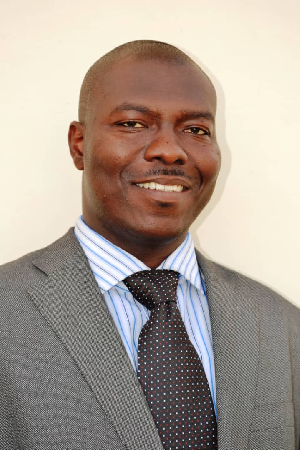General News of Tuesday, 13 March 2001
Source: Kwesi Wrekon Obeng (Public Agenda)
OPINION: Osafo-Maafo Bites Bullet
Words are cheap and actions dear so judgment on the Kufuor government's seriousness in pursuing better economic policies would still have to wait despite last week's presentation of the government's first budget read last Friday by Finance Minister, Yaw Osafo-Maafo.
Christened as an interim budget, it is different from the ex-government's budgets in many ways though not in all.
The budget statement presented to Parliament offers some tough solutions to Ghana's economic crisis.
The budget puts a lot of emphasis on strategies to control government expenditure, cut income and corporate taxes and probe government agencies.
Under Osafo-Maafo's austere budget, government will pay for expenses only if it has enough revenue to cover the expenses. In otherwise zero deficit financing.
The government will set up an Economic Policy Co-ordination Committee by March 31st to ensure that funds are used wisely to inject discipline in government business.
Funds collected by government agencies, which were not going to the Consolidated Fund, should be deposited in the fund, the Minister directed.
In a move that undoubted is causing some heavies to swivel uneasily in their soft seats, the government has vowed to launch a wide ranging auditing of some major state-owned enterprises and some divested companies.
During the electioneering campaigns, some political party leaders fingered the Malaysia-run Ghana Telecom as one company that should be audited for the ridiculous price it was sold to the new owners.
But in a move that is likely to prove controversial, the NPP government is also to pursue an aggressive divestiture programme to sell some of the remaining state assets to private investors.
Ordinarily, this should not have come as a surprise since the NPP represents the free market wing of Ghanaian politic but because of strong emotions evoked against the previous government's privitisation policies, the mere idea makes many people uncomfortable.
"Government will audit and review some divested companies whose divestiture may have been tainted with corruption and fraud with the view to ascertaining how transparent the exercise was with respect to pricing, modes of payment and procedures used in taking the assets of the companies," Osafo-Maafo said.
But would a more transparent process rehabilitate the divestiture or privitisation programmme in the public's mind?
Osafo-Maafo mentioned the Social Security and National Insurance Trust (SSNIT), State Insurance Company, Ghana National Petroleum Corporation, Electricity Company of Ghana, the deal STC struck with Vanef and the controversial Divestiture Implementation Committee (DIC) as some of the public institutions that will be investigated.
The Finance Minister also warned that all loan defaulters who received assistance to grow their businesses to settle their indebtedness by the end of May, this year or face public humiliation.
Osafo-Maafo warned of stiff punishment for ministries, departments and agencies, which go for credit facilities from Commercial Banks and other sources without Finance Ministry approval. Kwame Peprah ex-Finance Minister gave a similar order but failed to carry it through.
The pro-business NPP government also reduced corporate tax rates to 30 from 35 per cent for companies listed on the Ghana Stock Exchange. Non listed companies will pay 32.5 per cent of their profits as corporate tax. Big business had their withholding tax increased by two and half from five per cent.
But the government imposed a three-year National Reconstruction Levy on banks, pension funds and insurance companies. These companies will pay 15 per cent of their gross profits after deducting bad and doubtful debts.
In line with current dominant economic language, the government attempted to bridge to dive into the growth and poverty alleviation debate, by arguing that it would stimulate economic growth through poverty alleviation.
Specifically, the government said has allocated nearly two billion (?1,979.5 billion) to improve access to basic social services and infrastructure for the poor in society.
Up to sixty per cent of this amount will go into basic education, primary health care and provision of safe drinking water for rural communities. But the government also promised to go ahead with the construction of the capital-intensive Bui Dam, which is expected to complement the country's main source of electric power, the Akosombo Dam.
"Government has been concerned that about 40 per cent of Ghanaians are classified as poor and about 27 per cent as extremely poor and will therefore pursue policies that will accelerate the improvement of the welfare of the poor," Osafo-Maafo said.
The government proposes to eliminate extreme poverty by the end of its first term in office using an improved poverty alleviation strategy.
"This strategy will comprise measures to stabilise the economy including a debt management policy, a long-term growth and fully costed poverty reduction programme…" the Finance Minister told Parliament.
People earning below ?1.2 million as income will not pay personal income tax. This old figure was ?900, 000. Not much, if the inflation rate of 40.5 per cent is taken into account.
More significant is the raising of the income threshold from ?17.4 million to above ?48 million for application of the 35 per cent marginal tax.
Another remarkable difference between the new budget and the budgets of the NDC is that beneficiaries of marriage or children's relief, disabled person's relief, old age relief and other such relieves will enjoy this break upfront. In the past, these relieves were paid after the beneficiary had filed her tax returns.
Middle-upper and upper income groups also got tax breaks in accordance with the new Tax Law, Act 592, passed last year.
By far what surprised the minority in Parliament is the announcement that Ghana is going for HIPC debt initiative. Minority MPs raised their hands in disappointment when Osafo-Maafo told the House that "…the President of the Republic of Ghana had decided that Ghana should take advantage of the HIPC initiative."
"We are dead," some shouted in disgust as they rested both hands on their heads. The NDC reportedly rejected HIPC in both 1999 and 2000.
The budget statement commended the NDC government for some of its polices but Osafo-Maafo also took a couple of swipes at the NDC.
"The establishment of the Poverty Alleviation Fund under the District Assemblies Common Fund is one of the good initiatives of the NDC government, but its implementation left much to be desired."
Largely, the NPP government will continue with programmes and projects started by the previous government.
The government took this stand during the campaign for power, although it warned that it would be very reluctant to initiate new projects while huge deficits hung over us.
The 2001 budget is heavily dependent on donor support like the previous ones. For example, donors are providing ?186.59 billion of the ?203.53 allocated to Albert Kan-Dapaah's Energy Ministry for this year. The ?1,420.22 billion budget of the Education Ministry for 2001 is donor funded. The Education Ministry received the largest money.
Though construction programmes are not many as you find in NDC budgets, the Ministry of Works and Housing will provide 660 new boreholes, 350 new hand-dug wells, 40 mechanised community pipe systems, 30 new gravity pipe systems, 1,300 household latrines and 100 institutional latrines. The budget also appears to concentrate job creation in the rural areas.
Clearly, the budget is fairly modest compared to the recent previous ones but how it works to benefit the country's treasury and citizens is what will decide its fate as either a good or bad budget.










